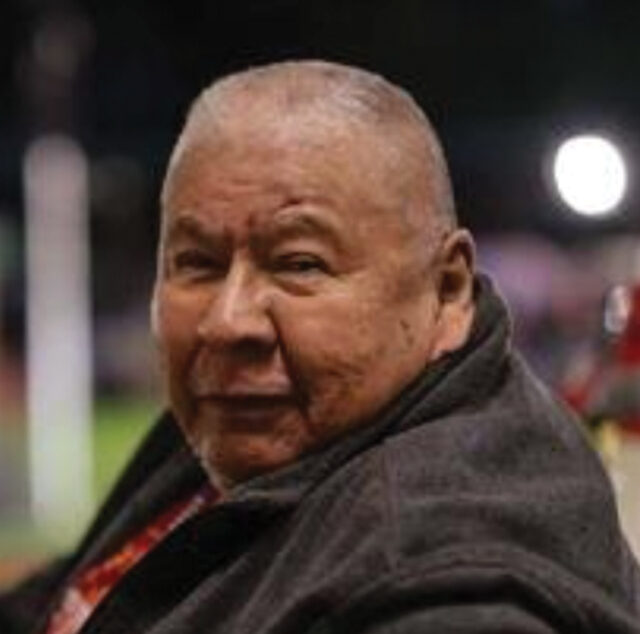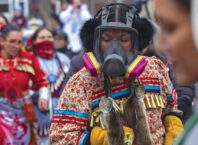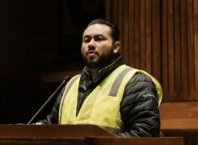By Winona LaDuke
“My heroes are the unacknowledged do-gooders that strive to help because they love humans and plants and water and still believe in the magic of this realm. There are people who prayed for you before you were born. There are people taking action every day. They’re not taking selfies or handing money to the homeless. They’re out there doing it for the greater good. Those are my heroes…” Dani Pieratos, Bois Fort Anishinaabe.
There have been some great ones who have passed to the spirit world these last months, leaving holes in our communities. I think of these times with great sadness but also think of the transition- the sharing between peoples and generations. We all carry a basket. That’s a basket which not only contains our possessions, land, things, which will be divided up after we have passed on, but also a basket of our gifts, our passions, our love, our work. Some of us hope to share much of the contents of our basket before we depart from this world; for others we can all share or shoulder what is in the basket.

The Apache have “burden baskets.” Cone shaped, with flat or rounded bottoms, embellished with fringe and cone jingles often, most baskets have a buckskin carry strap, worn around the forehead or shoulders. The baskets carried all that was essential for life. We continue to carry these baskets to share gifts of food and more. Who carries the baskets when we pass?
These past few months have seen the passing of great elder leaders from ceremonies, like Joe Nayquonabe Sr , Drum keeper, kind man, who appreciated us all. Dale Greene Sr, the last Anishinaabe to be born on the homeland at Rice Lake, before the creation of the Rice Lake refuge also a keeper of the ceremonial drums now dances in the milky way above, his legs strong. There were times when the drum dances were sparce in attendance, but now, the halls are full, and we can only hope that the songs and words are remembered and cared for, that the basket of the ceremony is still full. The ceremonial drums have seen many generations, let us continue to sound those drums and dance.
Early in the year, a great woman from Turtle Mountain reservation passed- Jacqueline Davis Wallette. We see other women stepping up to carry on some of those roles in the NDSU and Fargo and Moorhead community, and for those of us who took her generosity and grace for granted, I am hopeful that a little bit of the basket, a little bit of that fairy dust of kindness she had, is sprinkled throughout .

There’s something called survivor’s guilt. We wonder how did I get to continue? We are all survivors. As we get older, “we know more people on the other side than on this one”, I was told once by Winifred Jourdain, White Earth elder. She lived to be 101 and taught us all much. Some of us continue to meet more people, and to remember their ancestors to them, that’s a gift of age. And, with age, there are memories of the good deeds done by people. And many questions like “ What would Ingrid Do?”, when we remember the work of Ingrid Washinawatok El Issa, who was assassinated by the political forces in Colombia, and until her death carried out great leadership for women through the Indigenous Women’s Network and nationally through a broad network advocating for the rights of Indigenous peoples at the UN. Her patience and love is remembered, and I still hear her laughter.
The most recent couple of months which have been very unsettling.
The passage of young women is always a sorrowful time. Young women with great gifts of community generosity, laughter and skills beyond measure. Danny Pieratos and Simone Senogles were two such women. Both strong community members, mothers and aunties, they were forces of change in their communities and in Minnesota. Their sudden passing reminds me, and perhaps all to be kind to one another, show appreciation and love so that the sorrow and pain which is silently carried by women, is soothed. Indeed, these are harsh times, and the lateral oppression which is unleashed upon each of us in our communities, wears on our hearts.

Remembered for so much, among her gifts, Simone Senogles was a great basket maker. We cherish the patient teachings of baskets. “If you want to disempower a people, attack the women. I think that Indigenous women are dealing with this still…” Her work to protect Mother Earth and women continues, and her kindness is remembered. Together we strive to carry the contents of her baskets, and hopefully as women, we remember to be kind, and not carry the weapons of our oppressors’ hatred into our communities.
As the leaves change, we saw more great losses for our community. Certainly Ernie Stevens, compassionate and strong leader for our communities nationally, provided the example of principled leadership, love and commitment which guided much national work. He is missed by all of us.
The passage of two of my close colleagues from the Indigenous Women’s Network- Charon Astoyer (Comanche) and Pamela Kingfisher (Cherokee), gives us pause, gratitude and a moment of sadness and celebration. In 1986, alongside her husband Clarence Rockboy, Charon founded the Native American Community Board, on the Yankton reservation—an act of love and resistance that would blossom into a nationally and internationally recognized example of Indigenous women’s leadership, advocacy and vision.
That work grew into the Native American Women’s Health Education Resource Center, serving generations and advocating for the reproductive rights of Native women in national policy and financing. “Charon led with wisdom, strength, and fierce compassion,” said Katrina Cantrell, President of the Native American Community Board. “She held our stories, fought for our rights, and reminded us every day of the power we hold as Native women. Her loss is immeasurable, but we are committed to carrying her legacy forward – with the same fire, love, and dedication she gave us all.”
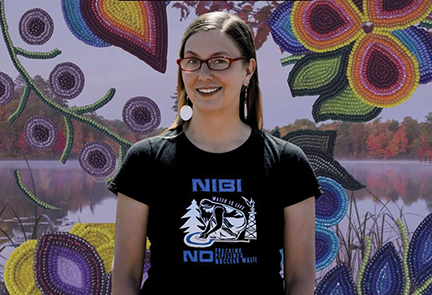
The same is true of Pamela Kingfisher, Pam worked for over forty years as a community organizer and led fights to shut down 23% of the world’s uranium supply and fight off big agricultural polluters from her Cherokee community. Today, we must face those demons again, as the Trump administration seeks to fast track dirty energy projects, and AI energy demands dictate policies.
“Asking questions…that is the key of organizing…nobody wants to be an activist, you know, but we are questioning, and we are very curious, and we want to know why, and we keep pulling those threads and pulling that string,” Pam would tell a reporter. In 1985 she moved to her grandmother’s allotment land in Oklahoma. There Native Americans for a Clean Environment was facing a uranium facility which wanted to deepen it’s impact on the health of the community. Opposing that was the work of Jesse Deerinwater. The proposal was to inject nuclear waste into the groundwater of the Cherokee people. The community organizing work stopped the injection well. Later, Deerinwater left and Kingfisher became the board chair for NACE.
The Sequoyah Fuels Nuclear Plant in Gore, Oklahoma was responsible for bringing in yellowcake uranium from New Mexico and turning it into uranium hexafluoride, used for fuel, and uranium tetrafluoride, used for the shelling of army tanks and bullets.
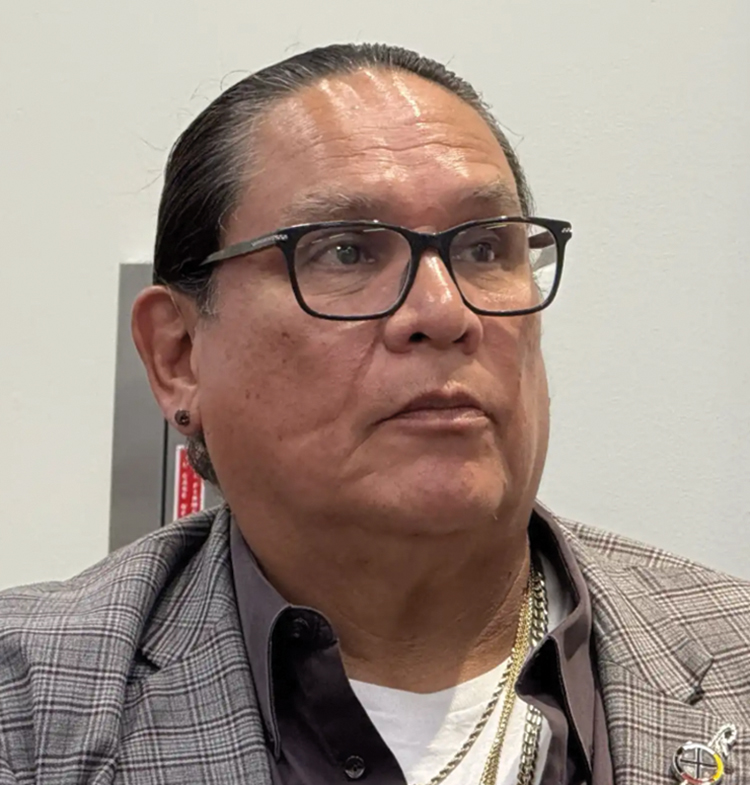
Instead of dealing with toxic waste, known as raffinate and partnering with Monsanto, the facility created fertilizer that was spread onto 10,000 acres. As a result, a “happy cow operation” came about. New cows would need to be brought in every 3 months to replace those who had died. A community working together challenged this, and created a cancer map of Gore Oklahoma, which never had been done by state or federal officials. Organizing as water protectors is what women do. One Saturday night, an explosion occurred and the plant was not immediately evacuated. Later that same night, 350 people were fired and the plant was closed.
Although the plant was closed, the Cherokee Nation continued to follow the yellow cake trail, their eyes on the company conducting the cleanup. The company tried to get the state to allow them to leave the waste on site. The Cherokee Nation fought and won a case forcing the company to move the waste to Utah. That is how change is made, by determination and love. “This is human health, this is public health. I don’t care what stripe you are. I do care that we all live in this place, and what are we passing on,” Pam would tell us.
As the times change, and our heroes and loved ones move to the star world, we are reminded that their baskets , full of love, hope and hard work, were carried far and even carried us . Let us share the baskets, work, love and joy, and as many Indigenous people enter these winter times. And let us carry their baskets forward, renewed with new harvests and dreams.


